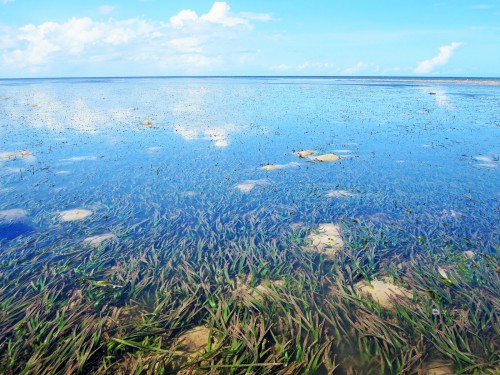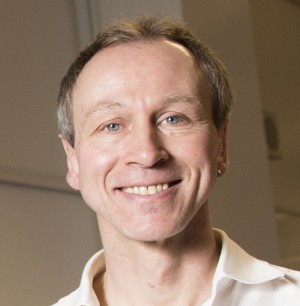The ability of seagrass beds to take up atmospheric carbon and lock it in at a rate of up to 35 times that of land-based carbon sinks such as tropical forests is a recent discovery.
Now a new study by a team of Edinburgh and East Africa-based scientists has shown seagrasses at a site in Kenya lock in 50% more carbon than is typical for seagrass meadows elsewhere – making their carbon-storing potential twice that of rainforests.
Super-efficient carbon sinks

Seagrasses are flowering plants that live in shallow waters on every continent except Antarctica, providing food and habitat for fish, dugongs and turtles. Out of sight, except at low tide, they have been under-researched. However, natural carbon sinks such as seagrass beds may play an important role in global climate change mitigation strategies.
As well as being super-efficient carbon sinks, the carbon that seagrass meadows store might be thousands of years old. Other natural carbon sinks re-release their captured carbon into the atmosphere at significantly faster rates.
The ESPA research project, Coastal Ecosystem Services in East Africa (CESEA), was carried out at Gazi Bay, in southern Kenya, and led by Edinburgh Napier's Professor Mark Huxham. Its findings are published this month in an open access paper in the journal PLoS ONE, ‘Carbon storage in the seagrass meadows of Gazi Bay, Kenya’.
Professor Huxham said: “People have looked at seagrass carbon in other places but there are few data from Africa. These particular seagrass meadows at Gazi Bay store more carbon than that found on average elsewhere. It may be that the conditions here, with clean, warm, productive waters and sunshine all year round, help to create very efficient carbon sinks.”
Ecosystem threat
Seagrass meadows globally are under intense pressure. Dragnet fishing, pollution, dredging and other human activities have already degraded around 60% of them. Their rate of loss is three times that of Brazilian tropical rain forest, and at current rates some half of them could be lost in the next 30 years.
In Gazi Bay, the seagrass meadows are part of the Diani-Chale Marine National Reserve and have protected status. However, in practice there is little enforcement of that protection and the use of seine nets is degrading the meadows in areas of intense fishing.

Professor Huxham is talking to local people about introducing a carbon offset scheme in which some of the poorest and most marginalised local people are paid for conserving this special ecosystem. A similar Payment for Ecosystem Services (PES) scheme is successfully working in nearby mangroves.
Professor Huxham said: “Conserving the seagrass bed is not only for nature’s sake. It is also about conserving that ecosystem to ensure the sustainability of the fisheries and to improve people’s livelihoods in the long term.”
ESPA is a global development research programme funded by the UK Government, supported by the Natural Environment Research Council, Department for International Development and the Economic and Social Research Council. ESPA aims to provide new world-class research evidence demonstrating how ecosystem services can reduce poverty and enhance wellbeing for the world’s poor.
The CESEA project is a collaboration between scientists and researchers in Tanzania, Kenya and the UK, bringing together experts in ecology and development to find new ways to help local people maintain their coastal resources whilst beating poverty.